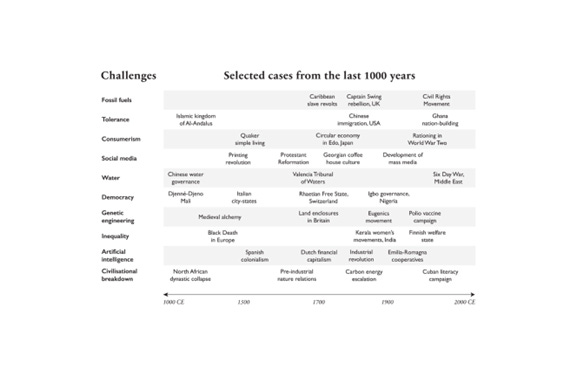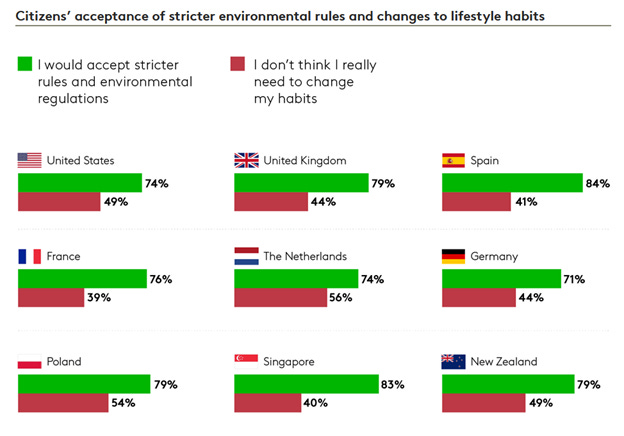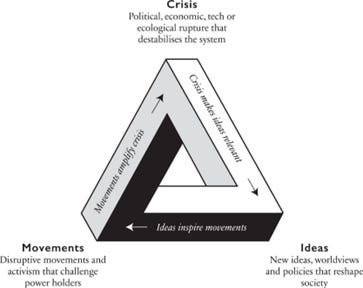5 Lessons From the Past to Overcome Capitalism
(commentary on Roman Krznaric's History for the Future)
Recency bias is a mental weakness of our brain that makes us favor recent events over historic ones. It’s about giving greater importance to the most recent event, such as the final lawyer's closing argument a jury hears before being dismissed to deliberate, or having the last word in a presidential debate.
The lesson here is that we should not leave all of history to historians, or we may be doomed to repeat the mistakes of the past, or forget the successes of the past.
Roman Krznaric [kriz-NAR-ik] writes in History for Tomorrow how events from the past can inspire us to tackle our modern challenges such as fossil fuels, consumerism, democracy, inequality.
#1 Radicals normalize change
The slave rebellion of 1831 in Jamaica and the Captain Swing Riots of 1830, had the powerful effect of accelerating the pace of change because they filled public discourse with anti-slavery, and anti-enclosure ideas. When radical flank groups take more extreme positions than the mainstream moderates, it makes the moderates appear more reasonable to the ruling class. The same happened with the Civil Rights Movement of the 1960s where the radical flank that included Nation of Islam and the Black Panthers, normalized the moderate movement for civil rights.
The radicals of today are Extinction Rebellion and Just Stop Oil, among many others. Not everyone agrees with them, but they play a crucial role in normalizing the moderate position that fossil fuels need to be phased out.
#2 Consumerism
John Woolman, born in New Jersey in 1720, was a Quaker. Quakers love simple living, which is codified in their rules that are still valid today, called the “Testimony of Simplicity”. Woolman was a cloth merchant for a living. He ended up making so much money that he tried to reduce his profits by telling his customers to buy less cloth and cheaper cuts. You don’t learn that in business school.
In these 9 rich countries, three-quarters of people believed more environmental regulations were important but almost half felt there was no real need for them to change their personal habits, and only a fifth thought it necessary for people to fly less or reduce their meat consumption.
What would it take for those living in the rich countries to adopt a simpler lifestyle? The most logical answer is: disaster. Can you think of anything else? Are you ready to embrace disaster yourself before you change your lifestyle and accept degrowth that is fair for all humans? I’m just asking for a friend.
#3 The Tribunal of Waters and the Commons
The Water Tribunal of the plain of Valencia, also known as the Tribunal of Waters is an institution of justice tasked to settle disputes arising from the use of irrigation water by farmers in several communities and canals in the region of Valencia in Spain. It is the World’s Oldest Court and the oldest democratic institution in Europe, going back to the 10th century.
The Water Tribunal and other similar examples, inspired economist Elinor Ostrom to develop a model of 8 principles for effective collective management of scarce resources: (1) participation of community members in making the rules; (2) a graduated system of sanctions for rule violators; (3) clear group membership boundaries of who can use the resource; (4) ensuring governance rules matched local needs and conditions; (5) making sure the rules are respected by outside authorities; (6) establishing nested tiers of governance; (7) developing systems for monitoring members’ behaviour; and (8) providing means for dispute resolution.
33 countries face extremely high water stress in 2040. How are going to manage that?
#4 Genetic Revolution and Intellectual Property
Jonas Salk discovered the polio vaccine, in 1954, which was funded largely by very small contributions of money from millions of people. The Salk Vaccine Trial that year inoculated more than 2 million children, and was a success. When journalist Ed Murrow asked him: Who owns the patent on this vaccine? Salk replied: Well, the people, I would say. There is no patent. Could you patent the sun?
GPS was first developed by the US Department of Defense in the 1970s to track and coordinate the deployment of military assets. How about the first virtual assistant, Siri? That came out of a US government-funded research project involving 20 universities, whose technology was then snapped up by Apple in 2010. You can find many more examples here.
The point is: we don’t need intellectual property for innovation.
#5 Dutch East India Company, Artificial Intelligence, Distributed Ownership
The Dutch East India Company, was the first ever publicly traded joint-stock company and the forerunner of the modern corporation, having made its first public share offering in 1602. This was the beginning of capitalism, by dividing property into shares, which then were sold to different investors. Power began to accumulate in proportion with the size of ownership. Speculative bubbles followed, the Mississippi Bubble of 1720, the South Sea Bubble and the Panic of 1825, the Great Depression of 1929, the Global Financial Crisis of 2008. And so many others.
AI is yet another gimmick that will lead to a similar bubble, because it is largely in the hands of capital owners. As long as algorithms, chat bots, fake image generators are used to grow profits, investors will be motivated to speculate and beat the market.
The cure for this bad design is distributed ownership, which is one of the principles that describes economic democracy. Cooperatives, such as Dairy Farmers of America, Rabobank in the Netherlands and the Mondragon federation in Spain, are businesses owned and directed by the company’s workers or customers. Their statutes typically incorporate social goals alongside financial ones.
I think the economy is going to get worse because wealth and income inequalities keep rising, the environment continues to degrade, power continues to concentrate in fewer and fewer hands. When we read hopeful books such as History for the Future, which is full of more great lessons that I am not able to cover here, I think it’s super-duper important not to confuse cause with effect, correlation with causation, symptoms with illness. Is the private ownership of the means of production at the core of capitalism? Are markets a representation of something deeper?
What are the fundamental principles, at the very bottom of the chain of causes? When I proposed that capitalism was defined as the trinity of property-power-capital that are linked with solid doctrines, I meant to describe fundamental principles. That is where the battle of ideas should take place.
Roman Krznaric suggested that:
“rapid, transformative change is most likely to happen when a Crisis occurs in conjunction with disruptive Movements and visionary new Ideas permeating society. None of them alone is sufficient.” (source: History for the Future)
If this disruption nexus is complete and has all elements, then fundamental change happens when we modify, upgrade, replace fundamental principles with better ones.
Imagine what kind of an economy we would have, if we phased out the oppressive doctrines that hold capitalism together.
If we feel in our guts that a new Occupy Wall Street is going to happen again, we should be ready to jump at the opportunity. Existing movements, and new ones, can take inspiration from the new ideas laying around, so when the crisis happens, they will demand precise policies that establish new fundamental principles.




